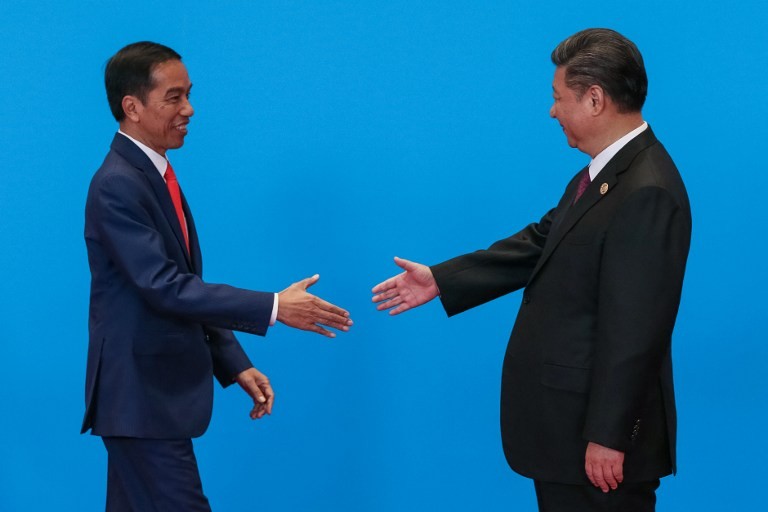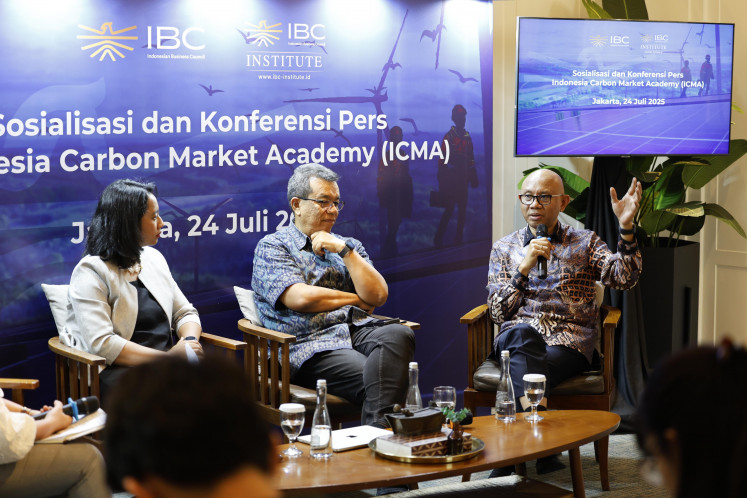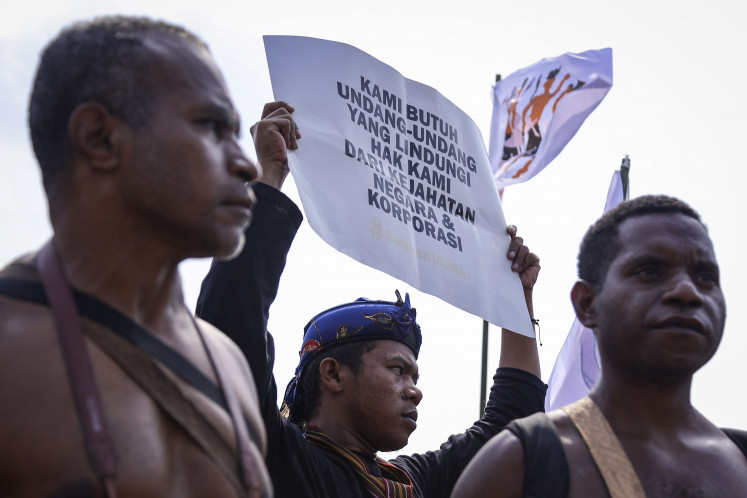Popular Reads
Top Results
Can't find what you're looking for?
View all search resultsPopular Reads
Top Results
Can't find what you're looking for?
View all search resultsSino-Indonesian exchange at new levels
According to Indonesian historian Mohammad Yamin, the influence of Chinese culture on Indonesian culture dates back to the Stone Age.
Change text size
Gift Premium Articles
to Anyone
S
ino-Indonesian cultural exchange has a long history. According to Indonesian historian Mohammad Yamin, the influence of Chinese culture on Indonesian culture dates back to the Stone Age. Religion and language were the main forms of communication in early Sino-Indonesian cultural exchange.
After diplomatic ties were established in 1950, Sino-Indonesian exchange flourished in sports, culture, religion, language, tourism, art and other fields. As soon as the Cold War ended, cultural exchange between China and Indonesia expanded, marked by a memorandum of understanding (MoU) on cooperation in tourism, health and sports, and a cultural cooperation agreement.
Since 2011, the two nations have made breakthroughs in their cultural exchange. More prominent events were held, such as the 2011 signing ceremony for a new MoU on bilateral scientific and technological cooperation, Science and Technology Week, the joint working group meeting on education in 2012, and an exchange involving 100 youths and the media exchange forum in 2013.
Sino-Indonesian academic cooperation reached new heights in 2014, with 13,689 Indonesian students coming to China. Students from Indonesia ranked sixth in their number among the 203 countries of origin, and were second only to Thailand among Southeast Asian countries.
A mechanism for people-to-people exchange was initiated at the deputy premier level in 2015, and three meetings have been held since then, pointing to the two countries’ direction in people-to-people exchange and cooperation.
In June 2016, Beijing Foreign Studies University (BFSU) established the Sino-Indonesian University Think Tank Alliance, another important landmark achievement in Sino-Indonesian cultural exchange. The alliance has seven members: BFSU, Central China Normal University, Guangdong University of Foreign Studies, Hebei Normal University, Gadjah Mada University, Yogyakarta State University (UNY) and the University of North Sumatra (USU).
The alliance serves as a platform for strengthening two-way talent training and promoting scientific research and policy dialogue, and facilitates educational information and academic resources sharing as well as exchange and cooperation among university think tanks.
It also explores new mechanisms for transnational talent training to promote a two-way flow of students between its member universities and strengthens cooperation between scientific research institutions and personnel as part of the alliance’s efforts to create a collaborative innovation community.
The alliance also focuses on specific policies of the China-Indonesia comprehensive strategic partnership to carry out targeted research and interpretation in order to consolidate public opinion of Sino-Indonesian relations from a strategic long-term perspective, and to create an environment for establishing good public opinion in promoting the development of bilateral relations.
This cultural exchange between the two countries possesses at least four characteristics. First, the strategic partnership guarantees cultural exchange. Sino-Indonesian cultural exchange is deeply influenced by bilateral political relations.
Second, the predominant bilateral exchange is complemented by multilateral exchange. Apart from their well known bilateral cooperation, China and Indonesia have also cooperated under the China-ASEAN multilateral framework in recent years.
When attending the China-ASEAN leaders’ meeting in the Philippines last year, Premier Li Keqiang promoted the formulation of the “Vision of China-ASEAN Strategic Partnership 2030”, upgraded the “2+7 Cooperation Framework” to the “3+X Cooperation Framework”, and built a new multidisciplinary cooperation framework on the three pillars of political security, economic and trade relations, and cultural exchange.
This is another important change in China’s policy toward ASEAN, and it provides new opportunities for cultural exchange between China and Indonesia and other Southeast Asian countries.
Since 2010, Sino-Indonesian relations have been warming up. The leaders of the two countries have held frequent visits and meetings. Mutual trust in the political sphere has been constantly enhanced.
Strategic policy communication has been timely and accurate, which in turn laid the foundation for cultural exchange and cooperation, particularly since Chinese President Xi Jinping’s 2013 visit to Indonesia. The leaders of the two countries have since met at third-party venues and exchanged more than 10 official visits and calls, while bilateral relations reached a new high. This is a rare achievement in the history of Sino-Indonesian relations.
However, challenges face the two nations in sustaining their close relationship. First is the language barrier to attaining mutual understanding. At present, Indonesia “constructs” its understanding of China mainly through the English media and the so-called mainstream reports from Western countries. The two countries lack a more comprehensive and objective understanding of each other.
Second, the exchange of religious figures and think tanks is lagging. This kind of deficit will seriously restrict mutual public recognition and hinder further development of cultural exchange.
Some recommendations can be made for China and Indonesia to strengthen their cultural exchange and cooperation. First, we should strengthen media cooperation, especially in the exchange and cooperation of new media.
Second, educational cooperation should cover two aspects. One is learning each other’s national language and culture. The two countries should also set up cultural research centers as soon as possible to direct cultural exchange.
Two, we should deepen cooperation between our universities and colleges, and together cultivate high-level talents such as Masters and PhD graduates, as well as young leaders, so as to continuously inject the sustained and stable development of bilateral relations with new vitality.
Third, the exchange of think tanks should be strengthened in discussing and communicating important issues in bilateral relations, mutual interests and concerns, cooperation modes and paths in people-to-people exchange, international and regional hot issues and ASEAN issues. The think tanks should also initiate joint studies and submit them to their respective governments as decision-making references to guide bilateral relations as well as cultural exchange and cooperation.
***
The writer is the dean of the School of Asian and African Studies at Beijing Foreign Studies University and executive director of the Sino-Indonesian Cultural Exchange Research Center. This article is based on her
presentation at the Belt and Road Initiative seminar on Nov. 27, which was co-hosted by The Jakarta Post.











